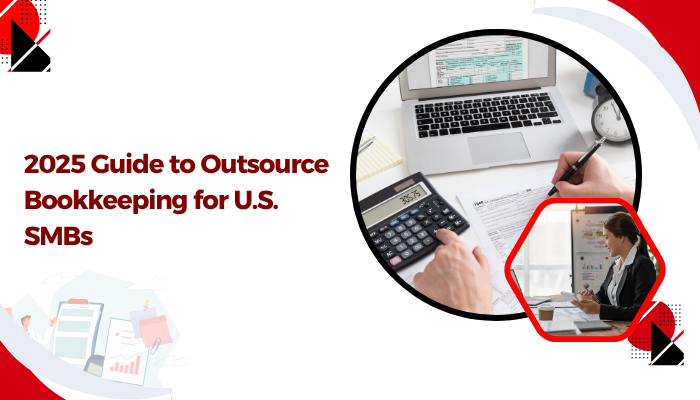2025 Guide to Outsource Bookkeeping for U.S. SMBs
If you’re a small or mid-sized business owner in the U.S., you probably didn’t start your company dreaming about bank...

If you’re a small or mid-sized business owner in the U.S., you probably didn’t start your company dreaming about bank reconciliations, expense categorization, or monthly profit and loss statements. And yet, here you are- juggling receipts, invoices, payroll, and wondering how many more hours you’ll lose to spreadsheets this week instead of deciding to outsource bookkeeping and reclaim your time.
Sound familiar?
You’re not alone. Thousands of U.S. SMBs are facing the same reality: bookkeeping is essential, but it’s also time-consuming, complex, and often frustrating. That’s why more businesses than ever are making a smart shift in 2025-they outsource bookkeeping.
But what does it really mean to outsource bookkeeping, and how do you know if it’s the right move for your business?
Let’s dive into this comprehensive, no-fluff guide tailored specifically for U.S. small and mid-sized business owners in 2025.
Why U.S. SMBs Are Choosing to Outsource Bookkeeping in 2025
Back in the day, having an in-house bookkeeper felt like the gold standard. Someone at a desk, crunching numbers, managing ledgers, handling payroll—it was familiar, and it worked.
But the business world has changed.
Today, remote collaboration is the norm. Cloud accounting tools like QuickBooks, Xero, and Zoho Books are more powerful than ever. And most importantly, business owners are starting to ask themselves:
“Is doing this in-house really the best use of our time and money?”
Here’s why more SMBs are saying “no” and choosing to outsource bookkeeping instead:
- Cost savings: Hiring full-time employees means salaries, benefits, and overhead. Outsourcing can reduce costs by up to 50%.
- Expertise on demand: Outsourced providers are often CPAs or certified bookkeepers who stay current with IRS regulations and tax law.
- More time for growth: When you’re not buried in numbers, you can focus on sales, strategy, and serving customers.
- Scalability: Need more support during tax season? Less during slow months? Outsourced services flex with your business.
What Exactly Is Outsourced Bookkeeping?
Let’s define it clearly.
To outsource bookkeeping means hiring a third-party service provider (individual or firm) to manage your business’s financial records. This can include:
- Recording transactions
- Reconciling bank and credit card statements
- Managing accounts payable and receivable
- Running payroll
- Preparing monthly financial statements
- Assisting with tax filings
Outsourced bookkeeping can be local, U.S.-based, or international- depending on your preferences, budget, and communication style.
When Is the Right Time to Outsource?
This question comes up a lot.
Here are some common signs it might be time to outsource bookkeeping:
- You’re spending more than 5 hours a week on financial admin.
- Your books are always behind- or worse, inaccurate.
- Tax season fills you with dread.
- You’re growing fast and need better financial insight.
- You’re ready to scale but not ready to hire full-time staff.
Think of bookkeeping like plumbing: when it works, no one notices. But when something leaks, everything gets messy fast. An outsourced bookkeeper ensures your financial “pipes” are always in good shape.
How to Choose the Right Bookkeeping Provider
Not all bookkeeping services are created equal. Here’s how to find the one that fits your business:
1. Evaluate Their Expertise
Do they understand your industry? A retail store has different needs than a SaaS startup or a law firm. Ask if they’ve worked with similar businesses before.
2. Check Their Tech Stack Compatibility
Do they use (or integrate with) your existing accounting software? Most modern bookkeepers should be fluent in tools like:
- QuickBooks Online
- Xero
- Zoho Books
- FreshBooks
- Gusto (for payroll)
If you’re using spreadsheets? It might be time for an upgrade- many outsourced firms will even help you transition to better software.
3. Ask About Security and Confidentiality
They’ll be handling sensitive financial data. Make sure they use encrypted systems, follow best practices, and are willing to sign NDAs if needed.
4. Request References or Case Studies
A trustworthy provider should have testimonials or examples of results from similar businesses.
5. Clarify Pricing
Some charge hourly. Others offer flat monthly rates based on volume or complexity. Get clear on what’s included- like monthly reports, meetings, and year-end summaries.
U.S.-Based vs. Offshore: What to Consider
One of the biggest decisions you’ll face is where to outsource your bookkeeping.
U.S.-Based Providers
- Familiar with local tax codes
- Easy time zone alignment
- Higher cost (typically $50–$150/hour)
Offshore Providers (e.g., India, Philippines)
- Cost-effective (rates often $15–$40/hour)
- Trained in global accounting standards
- Often highly experienced with U.S. systems
- May require more setup for communication and expectations
Outsourcing offshore- especially to well-established firms offering bookkeeping services in India- has become a smart strategy for budget-conscious SMBs. Many Indian firms now specialize in U.S.-based clients, offering round-the-clock support and high accuracy.
Real-World Example: How One Business Reclaimed Their Time
Let’s say you’re running a growing e-commerce brand with five employees and a few hundred transactions per month. You’ve been doing your books manually (or your cousin’s been helping).
Each month, you spend:
- 4 hours chasing receipts
- 3 hours reconciling accounts
- 2 hours fixing spreadsheet errors
- Countless hours worrying you missed something
You finally decide to outsource bookkeeping to a firm specializing in Shopify-based businesses. Within a month:
- Your books are up-to-date.
- You receive clean, easy-to-read monthly reports.
- You know your cash flow, profit margins, and expenses at a glance.
More importantly? You get back 10+ hours a month. That’s time you can now use to design new products, market your brand, or- imagine this- take a weekend off.
What to Expect During Onboarding
Outsourcing doesn’t mean instant results overnight. But a good provider will walk you through a smooth process:
- Initial call – They’ll learn about your business, goals, and current setup.
- System access – You’ll grant them access to accounting tools and bank feeds.
- Catch-up or clean-up – If your books are behind, they’ll help you get current.
- Monthly cadence – Regular reporting, updates, and ongoing communication.
Expect the first month to be a learning curve. But by month two or three, most businesses wonder why they didn’t make the switch sooner.
Final Thoughts
If you’re spending too much time on finances- or losing sleep over what you don’t know about your books- it’s probably time to make a change.
In 2025, the tools and services available to U.S. small businesses have never been better. And the decision to outsource bookkeeping isn’t about giving up control- it’s about gaining clarity, saving time, and growing with confidence.
And if you’re looking for quality, affordability, and expertise? Many business owners are choosing to outsource bookkeeping to India, where experienced professionals offer top-tier service at a fraction of the cost- without compromising on quality.
So go ahead- reclaim your time, reduce your stress, and get back to doing what you actually love about your business.
Click – thenewsus.com



